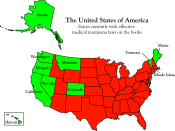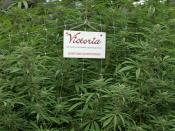Ryan Bustillos
English 101
David Cowper
February 25, 2009
Mary Jane Hits the Market
When it comes to making a quick dollar, not many people hesitate to find any way to earn that extra buck. Some people resort to prostitution, gambling, drug running; and anything that goes against the grain of the norm. With the nation's economy being almost as deep as the ocean, America is searching for a way to boost the economy. Is it possible that legalizing marijuana may become just? Keeping marijuana illegal may create fewer funds and create more problems in this unjust world.
Seeing our nation's economy in shambles is depressing, demoralizing, and tremendously frightening. As the nation's national debt tops ten trillion dollars, legalizing marijuana can only donate to decreasing debt. It is no secret that the United States and all levels of government participate in the "War on Drugs" every single year. A number of individuals in the marijuana business do not create any harm to the community or their surroundings.
However, when these "criminals" are caught it is only hurting the taxpayers of America. Food, housing, health care, attorney fees, and court costs are only a few of the expenses that taxpayers suffer for individuals possessing marijuana. Not only could America save billions of dollars a year on cutting back on locking up marijuana users but America can also profit on tax revenue. "Dr. Jeffrey Miron of Harvard argues that legalized marijuana would generate between $10 and $14 billion in savings and taxes every year -- conclusions endorsed by 300 top economists" (Richardson 1). Taxing marijuana would mean freeing up money to allocate in other areas that are more important such as school funding.
Although prohibition may seem positive to most, taking a deeper look may reveal an unjust situation that lies within prohibition. It seems that justice would be held to par when a product such as marijuana is legal and decriminalized. For example, many individuals would agree that alcohol and tobacco is much harder for a teen to purchase rather than teen's purchasing marijuana on the black market. There are not many drug dealers in America that card buyers before selling the product, it all comes down to one important component; that being money. "Regardless of one's view of marijuana use as normal or immoral, healthy or unhealthy, the fact is that over 70 years of government prohibition has done little to nothing to achieve the long-stated public goals of increasing youth perception of harm from marijuana useâ¦" (St. Pierre). Sadly enough, prohibition has already been attempted and failed miserably. During the 1920's to the early 30's, alcohol was prohibited in attempt to clean up America hygienically, morally, and socially. However, all those attempts hit rock bottom when law enforcement began to turn into a corrupt monster, crime became organized, and prison systems stretched to a limit that no longer sustained all criminals. "The contributing factor to the sudden increase of felonies was the organization of crime, especially in large cities. Because liquor was no longer legally available, the public turned to gangsters who readily took on the bootlegging industry and supplied them with liquor" (Poholek 1). Prohibition may look useful from an outside view; however prohibition may serve less justice than needed in such a crucial time.
Being healthy is the most important aspect of life for a majority of citizens in the country. Many over-the-counter drugs that sit in many American households such as Aspirin, Benadryl, etc. possess risks just as any illegal drug. "â¦science reveals that the risks of marijuana use, which have been thoroughly researched, are real but generally small" (Adams). Doctors often prescribe medical marijuana to cancer patients, people with sleeping disorders, and individuals struggling with severe depression. Dr. Donald Abrams, who is the chief of hematology and oncology at San Francisco General Hospital and professor of clinical medicine at UC San Francisco, spoke to an LA Times news reporter several months ago. "He says he is glad that he lives in California, where use of medical marijuana is allowed by state lawâ¦" (Adams). This is a prime example of doctors that are relying on medical marijuana to benefit their patients. The most important health statistic is not one person has been recorded dead due to marijuana use, even better that marijuana is not physically addictive such as alcohol or other substances.
America was founded upon justice and relies heavily upon a just system to keep our great nation in tact and morally unified. Decriminilizing marijuana may serve justice for many parties including the government, suppliers, and consumers. Due to the positive aspects of marijuana, the United States should legalize the drug; as it would be just and beneficial.
Adams, Jill. "Medical marijuana: What does science say?". LA Times. February 20 2009 <http://www.latimes.com/features/health/la-he-marijuana18-2008aug18,0,4886601.story>.
Poholek, Catherine. "Prohibition in the 1920s". February 18 2009 <http://www.geocities.com/Athens/troy/4399/>.
Richardson, John. "Why Obama Really Might Decriminalize Marijuana". Esquire. February 22 2009 <http://www.esquire.com/the-side/richardson-report/obama-marijuana-legalization-122308>.
St.Pierre, Allen. "On the Legalization - or Not - of Marijuana". New York Times. February 18 2009 <http://freakonomics.blogs.nytimes.com/2007/10/30/on-the-legalization-or-not-of-marijuana/?scp=3&sq=marijuana&st=cse>.





